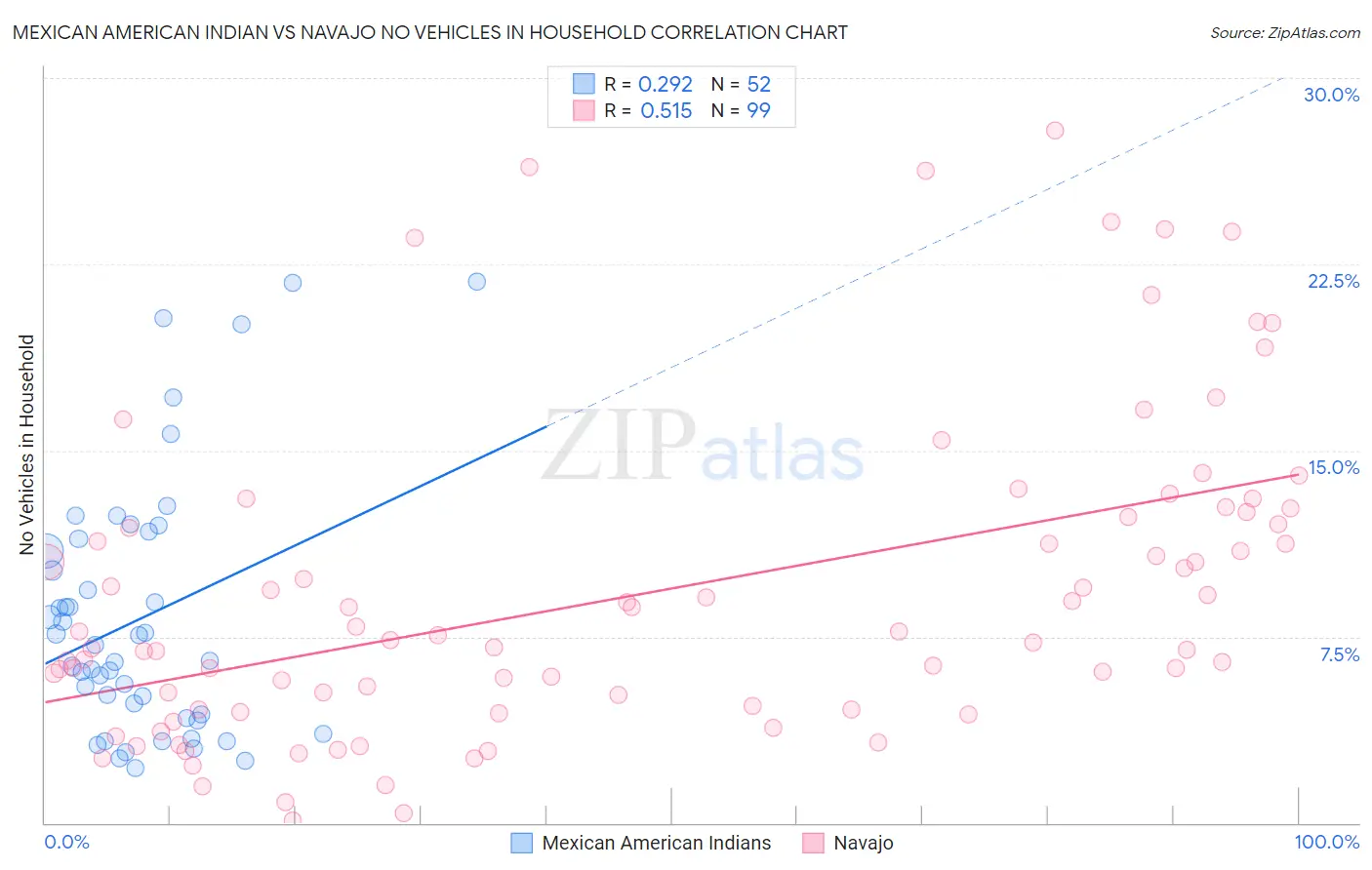Mexican American Indian vs Navajo No Vehicles in Household
COMPARE
Mexican American Indian
Navajo
No Vehicles in Household
No Vehicles in Household Comparison
Mexican American Indians
Navajo
9.1%
NO VEHICLES IN HOUSEHOLD
97.6/ 100
METRIC RATING
108th/ 347
METRIC RANK
9.4%
NO VEHICLES IN HOUSEHOLD
94.2/ 100
METRIC RATING
115th/ 347
METRIC RANK
Mexican American Indian vs Navajo No Vehicles in Household Correlation Chart
The statistical analysis conducted on geographies consisting of 317,109,278 people shows a weak positive correlation between the proportion of Mexican American Indians and percentage of households with no vehicle available in the United States with a correlation coefficient (R) of 0.292 and weighted average of 9.1%. Similarly, the statistical analysis conducted on geographies consisting of 224,409,454 people shows a substantial positive correlation between the proportion of Navajo and percentage of households with no vehicle available in the United States with a correlation coefficient (R) of 0.515 and weighted average of 9.4%, a difference of 3.6%.

No Vehicles in Household Correlation Summary
| Measurement | Mexican American Indian | Navajo |
| Minimum | 2.2% | 0.12% |
| Maximum | 21.8% | 27.9% |
| Range | 19.6% | 27.8% |
| Mean | 8.2% | 9.3% |
| Median | 6.8% | 7.4% |
| Interquartile 25% (IQ1) | 4.3% | 4.6% |
| Interquartile 75% (IQ3) | 11.2% | 12.3% |
| Interquartile Range (IQR) | 6.9% | 7.8% |
| Standard Deviation (Sample) | 5.1% | 6.3% |
| Standard Deviation (Population) | 5.1% | 6.3% |
Demographics Similar to Mexican American Indians and Navajo by No Vehicles in Household
In terms of no vehicles in household, the demographic groups most similar to Mexican American Indians are Hispanic or Latino (9.1%, a difference of 0.080%), Maltese (9.1%, a difference of 0.13%), Laotian (9.1%, a difference of 0.35%), Spanish American (9.1%, a difference of 0.44%), and Zimbabwean (9.0%, a difference of 0.60%). Similarly, the demographic groups most similar to Navajo are Serbian (9.4%, a difference of 0.070%), Japanese (9.4%, a difference of 0.070%), Chippewa (9.4%, a difference of 0.24%), Immigrants from Netherlands (9.4%, a difference of 0.49%), and Armenian (9.4%, a difference of 0.59%).
| Demographics | Rating | Rank | No Vehicles in Household |
| Pakistanis | 98.3 /100 | #101 | Exceptional 9.0% |
| Yugoslavians | 98.3 /100 | #102 | Exceptional 9.0% |
| Seminole | 98.3 /100 | #103 | Exceptional 9.0% |
| Zimbabweans | 98.0 /100 | #104 | Exceptional 9.0% |
| Spanish Americans | 97.9 /100 | #105 | Exceptional 9.1% |
| Laotians | 97.8 /100 | #106 | Exceptional 9.1% |
| Hispanics or Latinos | 97.7 /100 | #107 | Exceptional 9.1% |
| Mexican American Indians | 97.6 /100 | #108 | Exceptional 9.1% |
| Maltese | 97.6 /100 | #109 | Exceptional 9.1% |
| Delaware | 97.2 /100 | #110 | Exceptional 9.2% |
| Immigrants | Kuwait | 95.1 /100 | #111 | Exceptional 9.4% |
| Armenians | 95.0 /100 | #112 | Exceptional 9.4% |
| Immigrants | Netherlands | 94.8 /100 | #113 | Exceptional 9.4% |
| Serbians | 94.3 /100 | #114 | Exceptional 9.4% |
| Navajo | 94.2 /100 | #115 | Exceptional 9.4% |
| Japanese | 94.1 /100 | #116 | Exceptional 9.4% |
| Chippewa | 93.8 /100 | #117 | Exceptional 9.4% |
| Greeks | 92.9 /100 | #118 | Exceptional 9.5% |
| Fijians | 92.7 /100 | #119 | Exceptional 9.5% |
| Immigrants | Thailand | 92.6 /100 | #120 | Exceptional 9.5% |
| Puget Sound Salish | 92.4 /100 | #121 | Exceptional 9.5% |